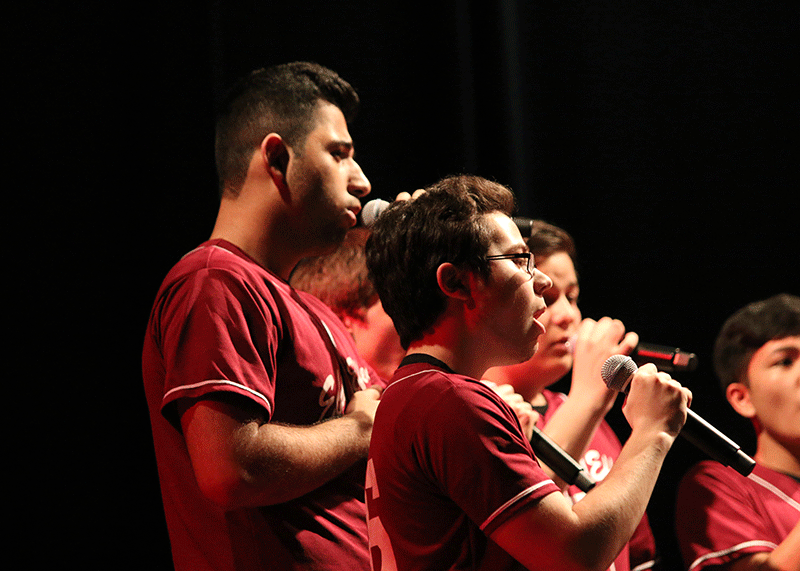On Christmas evening, the 7:30 pm showtime for Les Misérables at Regal Theatre in Village Crossing sold out. People of all ages and races, grown men with their wives and moms, and eight-year-old boys and girls filled the cinema playing the movie that was nominated for a Golden Globe (Best Motion Picture). Sure it takes a certain person to enjoy and appreciate a musical. There are costumes, dramatic exaggeration, and singing in almost every scene. But, there’s a reason for all the award nominations.
In at least three parts of the movie, the majority of the people in the theater were blowing their noses, making sobbing sounds that sounded like they were doing all that they could to hold noises in, and singing along and choking back at the same time. Lets just say my scarf was dripping wet from tears by the end of the movie. No, the audience wasn’t crying because they were dying of torture. They were crying because of the overwhelming brilliance.
Summary
Based on Victor Hugo’s novel in 1862 , Les Misérables has been created into Tony Award winning Broadway productions, a couple other major motion pictures, and even a comic book for young adults.
In France, Jean Valjean (Hugh Jackman), a skinny and poor man who spent 19 years in jail is finally receiving parole. He went to jail for stealing bread to save his sister’s sick son. After being semi-free, he gets invited to stay with a priest at a convent. The priest feeds him properly and offers his home to him for as long as Valjean wanted. Later on that night, Valjean steals all of the silver that the priest owns and flees the scene. The next day he gets caught by the police, and gets brought back to the convent to confront the priest about Valjean’s theft. Surprisingly, even though the priest knows that Valjean stole his things, he tells the police that he gave them to Valjean as a gift. In fact, he even gives Valjean two candle sticks with silver stands, too. After the police leave the convent, the priest and Valjean make an agreement. Valjean realizes that the priest was giving him a second chance to make his life better. He promises the priest that he will take the silver that he stole to be an honest man with morals.
Eight years later, Jean Valjean is the mayor of a small town in France and owns businesses that employ his town citizens. In one of his shops works Fantine (Anne Hathaway), a young woman with long beautiful hair gets fired from the company, because they find out that she is working to pay for her sick child. In the mean time, Inspector Javert (Russell Crowe), one of the policemen who guarded Valjean during his time in jail gets stationed to work in the town that Valjean is in. He creates suspicion and realizes that the mayor of the town was the convict who broke his parole eight years ago. At the same time, Fantine sells her beautiful hair and turns to prostitution to support her sick daughter Cosette. Valjean meets her, falls in love with her, and promises to take care of her daughter at her last hour. So then, Valjean runs away again, so he can complete his promise to Fantine. The chase is on between Valjean and Inspector Javert. Valjean is able to get Cosette before Inspector Javert catches them.
More years pass, Cossette went from a five year old girl to a girl around the age of 16. Her and her “father” Valjean move to Paris, where they are the Inspector finds them again. Many years have passed and Valjean still carries the past with him. He fails to tell his “daughter” about it, but in the process of running away from Javert again, Cosette (Amanda Seyfried) falls in love with a French Revolution leader, Marius (Eddy Redmayne). When Valjean finds out, he puts his life in danger by trying to save Marius in one of the battles from the French Revolution.
By doing so, Valjean increases his chances of getting caught. If Javert catches him, he could either kill him at the spot or arrest him and take him back to jail.
Acting and Performance
Anne Hathaway (Fantine) isn’t Mia from “The Princess Diaries” series anymore, or the pushover Andy from “The Devil Wears Prada.” She’s earned my respect as a serious actress because of her role in “Les Mis.” Even though she was probably only in the movie for 15 minutes or so, she still made quite an impression. Her portrayal of a mother sacrificing everything to save her child was brilliant. There wasn’t a dry eye in the house when she was singing “I Dreamed a Dream.” It’s no wonder that she was nominated for a Golden Globe (Best Supporting Actress).
Amanda Seyfried (Cosette) has the sweetest voice in the world. It’s hard to believe that she went from playing a dumb high school girl in “Mean Girls” to playing the leading role in a movie that has potential to win awards. Even though she was playing a role that was about ten years younger than her actual age, she was able to portray innocence and completely had the audience fooled.
Hugh Jackman’s (Valjean) singing skills were very impressive. X-Men’s Wolverine can carry a tune after all. He went from super natural super hero to serious father figure and war hero. Valjean’s Soliloquy was probably one of the best parts of the movie. Another thing that amazed me on his part were the special effects that they put on him. At the start of the movie, he looked so tiny and frail, and later on, not only did they make him look healthy, but they made him seem a foot and a half taller too. After this performance, it’s safe to assume that Jackman can take on any role. His Golden Globe nomination for best actor was well deserved.
Russell Crowe (Javert) did an unimpressive job portraying the villain in the movie. Even though he was the bad guy, he gave off an essence that still made everybody else love him. His role should have been more emphasized. Instead, he was just a character that could easily be brushed off and forgotten. As far as his singing goes, it wasn’t too shabby. Sure he doesn’t have the best voice in the world, but he could still hit the notes and stay on tune.
Eddy Redmayne ( Marius) was also great with his performance. His presence in the French Revolution battles was a perfect scene for him. The Seth Meyer look-a-like definitely won my heart both with his appearance and his acting skills. It would be a shame if his future in Hollywood did not turn out bright.
Sacha Baron Cohen (Thénardier) provided the comic relief in the film. I was grateful for his presence in the scenes, because it helped me get through with the rather serious and depressing parts of the movie. I couldn’t help but think about his role in Borat! Seeing him in bright costumes and seeing him dance was one of my favorite parts too.
Samantha Barks (Eponine) singing ” On My Own” (only the most famous songs from the musical) was really, extremely very, completely, disappointingly disappointing. She recorded the song for the Broadway concert soundtrack, and she’s sang it so much better before, too. I don’t know how she could have messed up the most important song in the movie. Besides that, her acting wasn’t very convincing. She should have stuck to Broadway, because the big screen, clearly wasn’t a good place for her.
Pass or Fail?
For being a movie that has a running time of over two hours, it was pretty fast paced. Not only is the story a great classic, but it is also a great source for learning about the long-term effects of the French Revolution. Overall it’s the perfect musical, and it definitely deserves to win all the awards that it is nominated for. The movie beats “Mamma Mia,” “Flower Drum Song,” and “The Sound of Music” any day. The all-star cast was a match made in heaven, and they have all showed clear talent after performing in the film. After reading the book, watching the Broadway productions, and the other two movies, it’s safe to say that the 2012 remake has a high spot on the list. Take your mom, dad, grandparents, or date.
Run Time: 157 minutes
Rating: PG-13















Hannah Williams • Feb 8, 2013 at 12:28 PM
Well, there are a few things off about this article,although in general, it’s pretty good… For one thing, there is no evidence that Jean Valjean ever falls in love with Fantine. He pities her, and feels that it is his fault that she’s in the state that she’s in, because he ignored her pleas as she was being fired. Now, I’m not saying that there wasn’t the possibility for romance had things turned out differently, but they didn’t, and there was no solid proof he was in love with her. He is just a exceptionally good person.
Also, not only was Marius not a leader of the revolution, (Enjolras was… In fact, Marius was really just a soldier. His part seems bigger because a. The boys at the barricade were all friends and b. the fimfocuses on him because of his relationship to Cosette.) but, as mentioned above, it wasn’t the French revolution. This was after, and part of the reason that everyone felt so strongly about this was that they had ALREADY had a revolution, and nothing had changed. (Therefore, Gavroche’s line of,”There was a time we killed the King, we tried to change the world too fast. Now we have got a different King, he isn’t better than the last. This is the land that fought for liberty, now when we fight, we fight for bread. Here is the thing about equality- everyone’s equal when they’re dead!” makes a lot more sense, because they DID kill the King, and they DID fight,but, obviously, little has changed)
I agree with most of what you said,although I think Samantha Barks was really good. She seemed so desperate and sad, but still spunky, streetsmart and even hopeful, and I enjoyed watching her much more than I enjoyed watching Amanda Seyfried, who I though was good, but boring. (Although I like Eponine more than Cosette, so I might be a bit biased.)
I don’t think that Javert is really the bad guy, I feel that Thenardier and Madame fit that role better, although I don’t think that they’re HORRIBLE either. Javert wasn’t a bad person, it’s just that he could only see things in terms of black and white, with no shades of grey. He simply believed that people could not be redeemed, and he was really only doing his job, which was to arrest Valjean. I also think that you gave Crowe too much credit. I don’t know if you’ve seen the musical, but Javert needs a powerful, baritone voice. That wasn’t Crowe. He could hit notes, but that’s all he did. There was no passion, no emotion, no character depth whatsoever. He didn’t run with the notes, be glanced at them and left them be. I really don’t know how he got cast.
On the note of the Thenardiers- Look, I love this family. Eponine,Thenardier, Madame, and Gavroche (Who is their eldest son in the book, it’s just never mentioned in the musical or movie…) are all great characters with unexpected depth. Monsieur and Madame Thenardier just seem like stereotypical evil, funny conman villains, but there’s more to them. They’re human. They have hearts. They are in a terrible situation, and they aren’t honest people, (or,argueably, even GOOD people) but they care for each other, and Eponine, too, although they don’t always show it. Need proof? Rewatch “Master of the House.” Look at how they dote on Eponine, kissing her, bouncing her on their laps, complementing her. Look at the chemistry between Sacha Baron-Cohen and Helena Bonham-Carter. The little glances and smiles they exchange, the easyness they have with one another, and of course, the way Madame mouths “I love you,” to Monsieur and winks show that they are a loving, albeit disfuncional,family.
I feel you should have mentioned the performances of Daniel Huttlestone,(Gavroche) Aaron Tveit, (Enjolras) Fra Fee, (Courfeyrac, the one really close to Gavroche, even though Gavroche is usually close to Grantaire) George Blagden (Grantaire, the student who always has a drink in his hand) and Helena Bonham-Carter, (Madame Thenardier) because I felt that they were so good, and even though their roles weren’t huge, they really stuck with me. I actually thought ALL the child actors were really good, which was really impressive. Daniel especially, his perfect balance between cute and tough, his smile and little Cockney accent, his long blonde hair and just his streetsmart attitude and adorableness (which, apparently, is actually a word…) just stole every scene he was in.
Sacha Baron-Cohen, Helena Bonham-Carter and Daniel Huttlestone really stole the show for me, even more than Anne Hathaway or Hugh Jackman, although I really liked them, too. I also really liked Eddie Redmayne- I still don’t like the character of Marius, but I really liked him.
Anyway, I DID like your review, even if it didn’t seem like it. I wasn’t trying to be rude, I’m just a HUGE fan of Les Mis and I wanted to put my input- well, IN.
I would give the movie 4 stars. Not five because many song lyrics were cut, I hated Russel Crowe, and they left out “Dog Eats Dog,” a song that I think is not only morbidly amusing, but also gives Thenardier a bit of character depth that I thought was lacking.
Hannah Williams • Feb 8, 2013 at 12:29 PM
Wow, I wrote a lot more than I meant to… I guess I got carried away… ^^;
Mizzie • Jan 8, 2013 at 11:48 AM
Good article, but there’s a big error.
First, this does not take place during the French Revolution. I understand you would think since the character Enjolras mentions it before a battle, but it’s not. The French Revolution was from 1789-1799, and this part of the film is 1832, WAY after. This actually called the June Rebellion, sometimes known as the Student Revolution since most of the revolutionaries are students.
Mizzie • Jan 8, 2013 at 11:54 AM
Also, Samantha Barks is not from the Broadway cast. The Broadway version of Les Mis closed when she was 12. After being a contestant on a competition show in the U.K. where the winning female gets the role on Nancy in Oliver!, she was chosen to play Eponine at the 25th Anniversary Concert for Les Mis. After that experience she joined the West End (London’s version of Broadway) to play Eponine. Barks never to came to Broadway, but maybe she will in the future.
Isabelle Davis • Jan 10, 2013 at 9:30 AM
Just so you know no one really agrees on when the French Revolution ended. Some people would conciser this to be a part of the Revolution while others would not. Although, to be fair, Les Mis is infamously inaccurate.